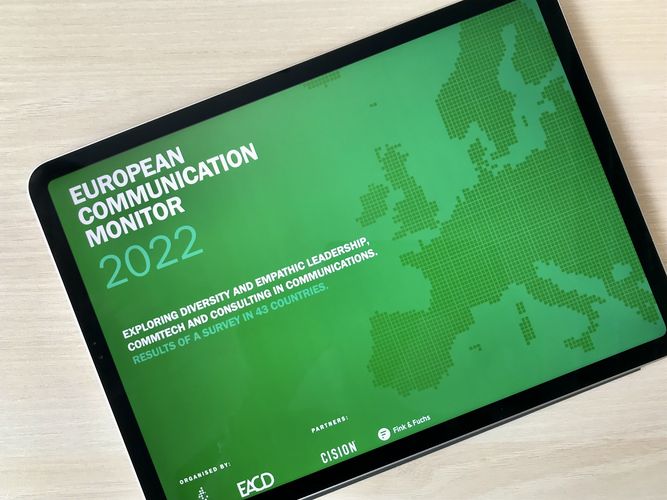The results of the European Communication Monitor 2022 have been published today. This year’s edition of the world’s longest-running survey of the communications profession is based on interviewing 1,672 communication professionals from 43 European countries, providing valuable insights for public relations, corporate communications and public affairs. The full report is available for free at www.communicationmonitor.eu.
The study examines whether and how much-discussed developments in societies and organisations resonate in today’s communication profession: these include ambitions to recognise diversity, equality and inclusion, and the trend towards a more empathic leadership style. Moreover, the digitalisation of communication departments and agencies and the dynamics of consulting in communications are explored. Salaries, key strategic issues as well as the characteristics of excellent communication departments have all been researched with more detailed analysis for 22 countries.
The project has been conducted and supported by a team of renowned communication professors from universities across Europe led by Prof. Dr. Ansgar Zerfass and managed by Jens Hagelstein.
Diversity, equality and inclusion as a challenge for the profession
The 16th edition of the European Communication Monitor explores whether and how the debate on diversity, equality and inclusion resonates in the daily practice of communication management in Europe. Results show that only every second practitioner has followed the global trends and discussions (50.7%). About the same number of respondents confirms that the topic is heavily discussed in their country (49.5%).
Every second organisation considers age, ethnicity, and gender when planning and executing communication initiatives. Sociocultural status, disabilities, worldviews and political opinions or spiritual beliefs are taken into account less often. Most practitioners acknowledge that diversity can impact trust with external and internal stakeholders, and they carefully consider diversity factors when producing content. But only one third believes in an actual change in the communication workforce in the near future.
Empathic leadership in communication teams
During times of crisis, such as the COVID-19 pandemic, there have been arguments that leaders of organisations communicate with greater empathy. The survey explores this phenomenon alongside the effect empathic leadership has on mental health, commitment and wellbeing.
Results show that three out of four communication practitioners (73.3%) report empathic traits from communication leaders with the majority of practitioners (56.7%) stating this has increased in the last year during the pandemic. The findings also show that communicators overall are committed to their organisations. Similarly, the respondents are generally highly engaged by their work. An encouraging figure is that only 1% are at risk of burnout.
The most important takeaway is that practitioners working for an empathic leader in a communication department or agency are significantly more committed and engaged and display better mental health levels. This is a strong argument for developing leadership competencies and team culture in this direction.
External consulting in communications: Complexity, quality and trends
The majority of communication professionals in Europe believe that the need for external consulting on stakeholder communications and on structure and processes for communications in organisations are increasing. Yet, at the same time, 63.9% of the respondents perceive the consulting industry becoming increasingly diversified and complex, and 60.1% state that securing the quality of external consulting is getting more and more difficult.
When asked about what is the most important dimension to secure the quality of consulting processes, respondents put people and know-how of clients and consultants at the top spot (89.9% mentioning this as important or very important), followed by project coordination between both sides in second position (87.7%).
A strong majority of communication professionals in Europe support the idea of quality standards for communication consulting: 67.8% agree with the statement that the profession needs overarching standards for consultants to assess and secure the quality of consulting in communications, and 60.7% believe that the profession needs also standards for clients.
CommTech and the digital transformation of communications
A rather surprising finding of this study is that only one third (35.5%) of communication professionals across Europe have followed the debate on using software and services to digitalise their function (CommTech) closely. Only a small majority (up to 55.2%) believe that these technologies will change the communication profession, the communication departments or agencies they work for and the way they personally work. But there are huge differences between countries, with no clear regional tendency. When it comes to assessing the risks, one third of all respondents think that CommTech has disadvantages for stakeholder communication, internal consultation or workflows.
The reluctance at the individual level of communicators corresponds with a moderate level of digitalisation at the meso level of communication departments and agencies. Only very few (6.2%) of these units have digitalised all their core activities and established a very advanced use of CommTech. Apart from these innovators, many lag behind in practice and are classified as outsiders, latecomers or a late majority by those working there. The biggest challenges in adopting CommTech are not technological issues (e.g., software performance) or human factors (e.g., lack of digital competencies among communicators), but factors that point to deficits within the respective organisations. Frequently, communication tasks and processes are not prepared for digitalisation (38.5%). The most common obstacles mentioned are inflexible structures and cultures, lack of support from IT departments and similar structural barriers (44.7%).
Full report
The full ECM 2022 report is available as free PDF and booklet:
Zerfass, A., Moreno, A., Tench, R., Verčič, D., & Buhmann, A. (2022).
European Communication Monitor 2022. Exploring diversity and empathic leadership, CommTech and consulting in communications. Results of a survey in 43 countries. Brussels: EUPRERA/EACD.
More information and previous studies are available at www.communicationmonitor.eu.
